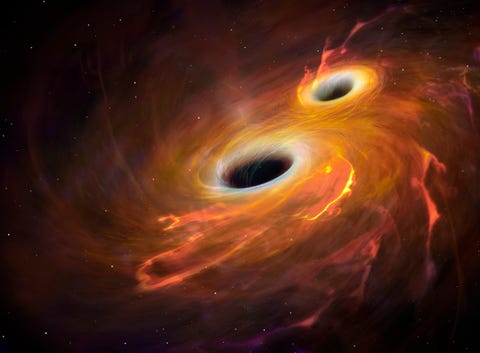Scientists Just Experimentally Proved One of Hawking's Wildest Theories
Hawking radiation from black holes has never been tested in the lab, until now.
By Avery Thompson
GETTY IMAGES/MARK GARLICK/SCIENCE PHOTO LIBRARY
Stephen Hawking was a brilliant physicist, but a lot of his theories were strange and difficult to prove. Perhaps his most famous of these involves what comes out of black holes. In 1974, Hawking theorized that black holes emit some kind of radiation, called Hawking radiation, and now, nearly fifty years later, a group of researchers have managed to provide experimental evidence for this theoretical radiation.
We all know black holes theoretically suck in everything, even light, but it’s not technically true that nothing can ever escape them. If that were the case, black holes would violate the laws of thermodynamics. Everything in the universe needs to radiate heat, and black holes are no exception. But exactly how they radiated heat was a bit of a mystery, until Hawking.
Hawking theorized that this radiation was happening because of some effect relating to quantum mechanics, although this was difficult to prove because no scientists ever had any black holes around to test it. But recently, some scientists have been able to use extremely complicated setups to simulate the effects of a black hole in the lab, and one of these setups was recently able to observe Hawking radiation firsthand.
Simulating black holes isn’t quite as scary as it sounds. Typically these experiments simply involve laser light combined with optical fibers, or water or sound waves traveling through specially designed tanks. In this experiment, researchers sent laser light through an optical fiber in a precise way to simulate the edge of a black hole. Normally in these experiments, no light can escape the fiber, just as in a real black hole. But by stimulating the entire contraption with another laser, the team was able to get some radiation out.
So does this prove Stephen Hawking was right? Probably, but as with anything in science there’s still some margin for doubt. The experiment will have to be repeated and improved before anyone starts drawing firm conclusions, but for now it’s safe to say that Hawking was very likely right about even his strangest theory.
Source: PhysicsWorld
No comments:
Post a Comment